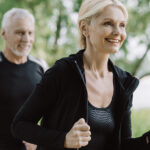
What happens if you do: You can put a serious dent in chronic depression and anxiety
What happens if you don’t: You may become unnecessarily dependent on antidepressant and anxiety medications that have side effects.
As you already know, exercise is guaranteed to generate endorphins, the body’s feel-good chemicals, typically within the first five minutes of a workout. But there’s more to it: Exercise causes the same structural changes to the brain as antidepressants, increasing blood flow and creating new neural pathways. (Sometimes, pharmaceuticals and exercise are the best combination.)
All types of exercise are associated with improved mental health…
but the strongest correlation is seen in those who do team sports, cycling, aerobic and gym exercise. Moderate intensity exercise, for 30 to 60 minutes, five days a week, is connected with the greatest reduction in poor mental health days. You can expect to see results fast: In response to aerobic activity, participants in a large study felt better after a single exercise episode.
A caveat:
Don’t overdo it! Exercising too much — more than three hours a day, as practiced by athletes in intensive training — is associated with worse mental health than not exercising at all.
Why does it work? That’s still under investigation. Some researchers believe that exercise alleviates chronic depression by increasing serotonin (the same neurotransmitter targeted by antidepressants) or BDNF — brain-derived neurotrophic factor — which supports the growth of neurons. Improved sleep, a common outcome of adopting an exercise program, is also a well-investigated contributor to better mental health.
This biological mechanism involves the hypothalamic-pituitary-adrenal (HPA) axis, which communicates with several regions of the brain, including the limbic system, which controls motivation and mood; the amygdala, which generates fear in response to stress; and the hippocampus, which plays an important part in memory formation as well as in mood and motivation.

Many studies have shown that exercise changes the way that people react to stress, providing a form of “biological toughening.” If your heart pounds and you perspire during a workout, your familiarity with those physiological responses may prevent you from going into an “anxiety attack” tailspin when you’re in an emotionally stressful situation.
Expert tip
Instead of meeting up with friends for pizza and beer, try to schedule some physical activity first. Group exercise — cycling, walking, dancing or jogging with others — whether they’re buddies or not — can banish the feelings of isolation that often accompany depression and anxiety, and provide the whole crowd with a welcome sense of accomplishment. I know, because six months ago, I started an e-biking group, gathering people who had never met before. Every Sunday at 10:15 am, we head out on a 30-mile ride, even if the weather’s not too great. Afterwards (hobbling a bit, because we’re all getting up in years), with broad smiles of accomplishment on our faces, we sit down together to enjoy a well-deserved lunch. And yes, we order French fries.





